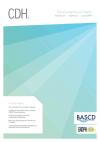Community Dental Health

- Cover Date:
- June 2019
- Print ISSN:
- 0265 539X
- Electronic ISSN:
- 2515-1746
- Vol:
- 36
- Issue:
- 2
In-school toothbrushing programs in Aboriginal communities in New South Wales, Australia: A thematic analysis of teachers’ perspectives
10.1922/CDH_4443Dimitropoulos05
Objective: This qualitative analysis explores how school staff interacted with a daily in-school toothbrushing program in three schools in
rural areas in Central Northern New South Wales, Australia, with a high population of enrolled Aboriginal students. Research design:
Three focus groups were conducted in the schools. Participants included school teachers and one Aboriginal Oral Health Aide who manage
the daily program. Focus groups were conducted, and where permitted, audio-recorded and transcribed verbatim. Thematic analysis was
used to analyse the transcripts. This study was granted ethics approval by the New South Wales Aboriginal Health and Medical Research
Council (App 1281/17). Results: Four themes were identified: 1) Belief of Program Need and Benefit; 2) Forming routine; 3) Children’s
responses and 4) Sustainability. School staff embraced the program and valued the need for and benefit of the program for children in
their school, seeing it as part of the extended role of the school to promote students’ health and well-being. Two important enablers for the
program’s sustainability emerged; promoting and supporting local school leadership and training existing school staff or local Aboriginal
people to manage it. Conclusion: Training local Aboriginal people or existing school staff to implement a daily in-school toothbrushing
program and facilitating school leadership is an important enabler for sustainable oral health promotion, including in-school toothbrushing
programs, in Aboriginal communities.
Key words: Toothbrushing; schools; communities
- Article Price
- £15.00
- Institution Article Price
- £
- Page Start
- 106
- Page End
- 110
- Authors
- Yvonne Dimitropoulos, Alexander Holden, Woosung Sohn
Articles from this issue
- Title
- Pg. Start
- Pg. End
- Editorial - How soon is soon enough? The challenge of implementing behaviours conducive to good oral health in at-risk infants and toddlers
- 89
- 90
- What influences use of dental services by the Korean disabled people? The role of perceived barriers in dental care system
- 101
- 105
- In-school toothbrushing programs in Aboriginal communities in New South Wales, Australia: A thematic analysis of teachers’ perspectives
- 106
- 110
- Relationship between Caregivers’ Oral Health Literacy and their Child’s Caries Experience
- 111
- 117
- The Effectiveness of Reform in the Dental Health Systems of Transitional Countries: The Case of Montenegro Health Reform (pilot study)
- 126
- 130
- Costs of dental care and its financial impacts on patients in a population with low availability of services
- 131
- 136
- Comparison of two measures to determine the oral health-related quality of life in elders with periodontal disease
- 143
- 149
